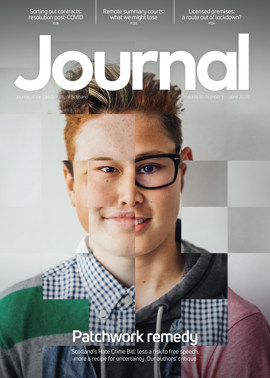President's column
A very warm welcome to January’s column. I am not sure when you will read this so I hope it’s not too late to wish you a happy new year! I wish you every personal and professional success for the year ahead.
The legal year certainly does look as though it will be challenging. The Conservative Party won the general election with a significant majority. After all the controversy at the end of the last Parliament, culminating in the Supreme Court’s historic prorogation decision, it was reassuring to see the party’s manifesto reaffirm that it stands for democracy and the rule of law and acknowledge that “our independent courts and legal system are respected throughout the world”.
Politics and law
Following a general election campaign in which populist tactics were employed, we hope that such populist impulses do not evolve into laws and policies which are problematic from a rule of law perspective. This has, unfortunately, been the experience of other countries where politics has taken a populist turn. The Society will continue to engage, positively and constructively with the new Government, as we have done with every democratically elected party, to explore ways in which its welcome commitment to the rule of law can be realised in practice.
One of the obvious consequences of the election result is that it appears that the UK will now leave the European Union on 31 January. This will have significant legal implications for many of our citizens and our profession. An explicit commitment in the Conservative manifesto was that the rule of law will be at the heart of the UK’s post-Brexit foreign policy: “we will continue to be an outward-looking country that is a champion of collective security, the rule of law, human rights, free trade, anti-corruption efforts and a rules-based international system”. This is surely the only way forward, if a legal, agreed, orderly exit from the EU is to become a reality.
Of course, the election result was also hugely significant in Scotland, with more SNP MPs going to Westminster. It appears from some comments that the party is considering legal action with a view to securing the right to have a second independence referendum. It appears that the UK’s unwritten constitution and the current devolution settlement may come under considerable scrutiny again. How things will develop from a legal and constitutional standpoint is not immediately apparent.
Section 30 of the Scotland Act makes no mention of independence, referendums or even the constitution. The section allows the UK Government to make an order altering the list of reserved matters. An order was made in 2014 to provide Holyrood with the legal powers to have an independence referendum. In the event that the UK Government declines a request to make a similar order this year, the Scotland Act does not provide a dispute mechanism or a right of review or appeal. It is not clear what the next legal step would be. What is clear is that some of our members, and friends in the Faculty of Advocates, will have been instructed to do some very interesting reading during their Christmas holidays.
Foundation support
One of the Society’s very last engagements of last year was to host the Women in Law Group “Gender Equality in the Legal Profession” event in Edinburgh. I was delighted to speak at the event because gender equality is an issue in which men must be involved. I wanted to highlight some of the achievements of women in law in 2019. It was a very, very long list so I was only able to include a few. The profession has made good progress but there is still a long way to go. I would like to thank WIL for donating half of the proceeds of the event to the Lawscot Foundation, with the remainder going to Scottish Women’s Aid.
It is quite humbling to see the generous contributions being made to the Foundation. A very big thank you to our friends at The Herald, who made it their charity of choice at the recent Law Awards. Thanks to everyone who sponsored a bauble during the festive Baublefest, and to the Foundation sponsors for their substantial, continuing support.
Before signing off I hope that you will want to join me in congratulating Street Law, which has successfully completed five full years of programmes. It is a tremendous initiative, involving schools with the law and talking about street crime and human rights or running mock trials. Thank you to Pinsent Masons, who provide significant financial backing to the project which benefits pupils across the country.







